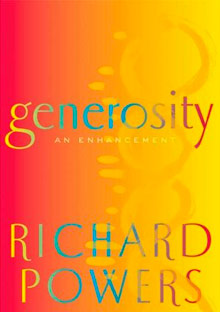
About this book: When Chicagoan Russell Stone finds himself teaching a Creative Nonfiction class, he encounters a young Algerian woman with a disturbingly luminous presence. Thassadit Amzwar’s blissful exuberance both entrances and puzzles the melancholic Russell. How can this refugee from perpetual terror be so happy? Won’t someone so open and alive come to serious harm? Wondering how to protect her, Russell researches her war-torn country and skims through popular happiness manuals. Might her condition be hyperthymia? Hypomania? Russell’s amateur inquiries lead him to college counselor Candace Weld, who also falls under Thassa’s spell. Dubbed Miss Generosity by her classmates, Thassa’s joyful personality comes to the attention of the notorious geneticist and advocate for genomic enhancement Thomas Kurton, whose research leads him to announce the genotype for happiness.
Russell and Candace, now lovers, fail to protect Thassa from the growing media circus. Thassa’s congenital optimism is soon severely tested. Devoured by the public as a living prophecy, her genetic secret will transform both Russell and Kurton, as well as the country at large.
What will happen to life when science identifies the genetic basis of happiness? Who will own the patent? Do we dare revise our own temperaments? Funny, fast, and finally magical, Generosity celebrates both science and the freed imagination. In his most exuberant book yet, National Book Award winner Richard Powers asks us to consider the big questions facing humankind as we begin to rewrite our own existence.
— From the publisher
Read O 's review
Questions for Discussion
1. Writing and the role of the imagination are central to Generosity . What is creative nonfiction? How does Russell’s course—Creative Nonfiction 14, Sect. RS: Journal and Journey—relate to the novel you are reading?
2. On page 12 Richard Powers writes, “Blogs, mashups, reality programming, court TV, chat shows, chat rooms, chat cafés, capital campaigns, catalog copy, even warzone journalism all turn confessional. Feelings are the new facts. Memoir is the new history. Tell-alls are the new news.” Do you agree with this analysis? What does it mean for popular culture to be so dominated by “true confessions” and “memoir”? How does this relate to our emphasis on “reality” television? Where does this leave the novel?
3. On page 181 there is a press conference to announce: “ Happiness gene identified? Did you think it would evade detection forever? The Alzheimer’s gene, the alcoholism gene, the homosexuality gene, the aggression gene, the novelty gene, the fear gene, the stress gene, the xenophobia gene, the criminal-impulse gene, and the fidelity gene have all come and gone. By the time the happiness gene rolls around, even journalists should have long ago learned to hedge their bets.” What does the idea of a happiness gene mean to you? Do you agree with Thomas Kurton when he says, “Why shouldn’t we make ourselves better than we are now? We’re incomplete. Why leave something as fabulous as life up to chance?” Do you want to reverse the aging process and live forever?
4. Why does Russell’s moment of celebrity as a magazine writer end so soon?
5. Why do you think Richard Powers made Thassa Algerian? What did you learn about Algeria from the novel that you didn’t know before?
6. Why does John Thornell attack Thassa? What do you think of Russell’s reaction to the attack?
7. Does your view of Thomas Kurton change in the course of the novel?
8. What role does the idea of prophecy play in the novel?
9. What is Powers’s view of free will? What’s your view of our future if genetic determinism prevails?
10. What was your first impression of Thassa? What did you decide was the root of her happiness? And how much did you change your view by the end of the novel?
11. How are Russell and Candace good for each other while also being an unlikely couple? How fair or unfair do you think it is for Candace to be asked not to see Thassa? Did she surprise you by complying, and why do you think she did?
12. Discuss the happiness experiments that Candace tells Russell about on pages 125– 27. How do their careers—his as a writer and hers as a psychotherapist—shape the way they interpret life’s circumstances? Is it easy for you to approach good surprises without worrying, applying the mentality of “A dime’s a dime. Grab it when you see it”?
13. Ultimately, what is Tonia’s role in Thassa’s life?
14. Discuss Thassa’s appearance on Oona’s television show. What does Thassa’s experience with the media say about the way we gather information, and the way identities (of celebrities and regular viewers alike) are manufactured in the age of new technology?
15. Should Thassa have been allowed to sell her eggs? Was Truecyte entitled to a licensing fee? Discuss the need for boundaries between science, medicine, and big business.
16. How did you react to the novel’s closing scene? Who did you think was narrating the novel up until that point? Were you surprised by Thassa’s final appearance?
17. Who are the novel’s most generous characters? Are these also the happiest ones?
18. How would you respond if you tried some of Russell’s writing assignments, such as “Find one thing in the last day worth telling a total stranger,” or to Candace’s suggestion—“Close your eyes and write a sentence in the air. Use your left hand. Just one sentence. A simple one”?
19. What do you believe about the nature of happiness? Which factor is stronger in determining whether someone will be happy: genetics or generosity? What (or who) brings you the most happiness? Would you be willing to take a pill or participate in genetic-engineering experiments if it meant being happier?
20. Are there themes and ideas in Generosity you recognize from other books by Richard Powers? And in what ways is this novel a departure or different from his other books?
Get more reading guides




